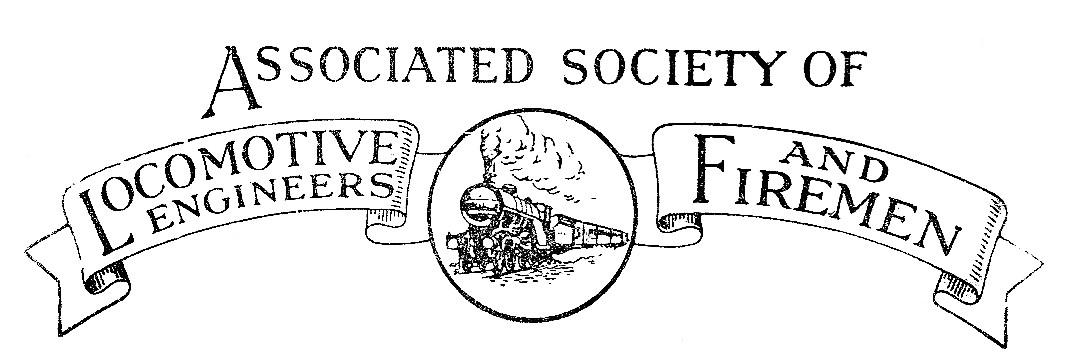
THIS WEBSITE, THE BRIGHTON BRANCH OF A.S.L.E.&F.
HAS NOW BEEN MOVED TO A NEW SITE CALLED
IGNITING THE FLAMING OF UNITY
http://ignitingtheflameofunity.yolasite.com/1965-manning-arrangements.php
PLEASE CLICK ON THE IMAGE BELOW TO TRANSFER TO THIS NEW SITE
CLICK ON THE ABOVE IMAGE TO TAKE YOU
TO THE NEW UPDATED COMBINED AND WEBSITE
IGNITING THE FLAME OF UNITY WEBSITE
THIS WEBSITE COMBINES THE FOLLOWING WEBSITES
THE BRIGHTON A.S.L.E.&F., THE BRIGHTON MOTIVE POWER DEPOTS
& THE SUSSEX MOTIVE POWER WEBSITES
WHICH EXPLAINS THE EVOLUTION OF THE FOOTPLATE GRADES AND THE HISTORY OF THEIR TRADE UNIONS AND THE STRUGGLES TO IMPROVE THEIR WORKING LIVES
THE 1965 MANNING ARRANGEMENTS FOR LOCOMOTIVES
This was to become one of the most important changes within the history of the footplate grades, which resulting in many
loco-men being forced out of the industry.
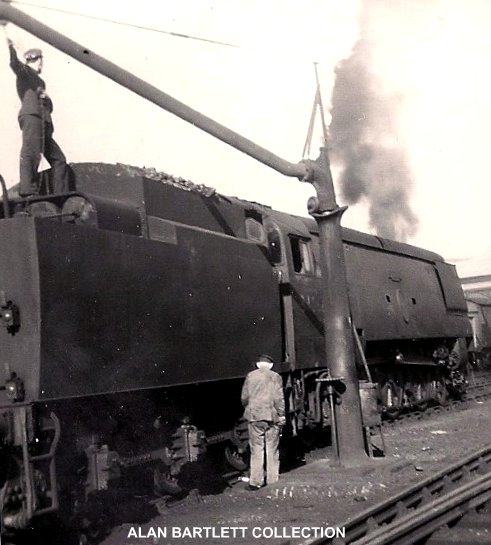
Above
taking water at Brighton loco shed
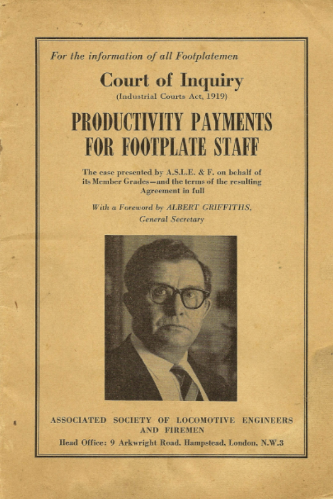
Industrial Courts Act, 1919
Court of Inquiry
appointed by the Minister of Labour
on 9th September, 1965
STATEMENT BY MR. A. E. GRIFFITHS
ON BEHALF OF THE
ASSOCIATED SOCIETY OF LOCOMOTIVE
ENGINEERS AND FIREMEN
AT THE HEARING OF THE PARTIES
BY MR. A. J. SCAMP, ON 13th SEPTEMBER, 1965
MR. GRIFFITHS: The claim I am submitting on behalf of my
Society is for a Productivity Payment for all Footplate Staff. In
this connection, I am referring to all Drivers, Firemen and
Second Men-by Second Men, I mean the man who assists the
Driver on a diesel or electric traction unit.
It was the strongly-held view of my organisation that this
application should be conducted separately and apart from any
discussion of the question of manning of the new forms of
traction. Nevertheless, we have agreed with the Railways to a
relaxation of the Manning Agreement which was reached in
1957.
At a later stage in my argument I would like to enlarge on our
opposition to the extension of single manning. Meantime I
would say that for the information of the Court, I have set out
in Appendix "A". to my statement particulars of the present
arrangements so far as the manning of diesel and electric
traction is concerned.
May I at this point take the opportunity to express regret in
regard to the unofficial action taken by members of my
Society on certain sections of British Railways. That action
was determined by the considerable delays which have taken
place up to date; and I would strongly emphasise that it is due
simply and solely to the continued and strenuous efforts of my
organisation to restrain the feelings of the men that
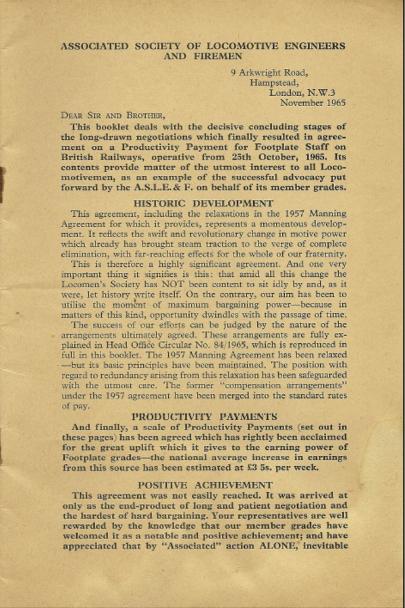
the successive outbreaks have not been more wide spread or
prolonged than in fact was the case.
It is also regretted that we find ourselves as a Society obliged
to submit our claim to this Court of Inquiry. It is our view that
had reasonable consideration been given by the Railways to
this matter, it could have been settled a long time ago.
Here I would outline the history of events leading up to the
present situation which has necessitated our approach to the
Minister.
We reaffirmed this view at a further meeting of the
Productivity Council held on 28th September, 1962, and at a
later meeting held on 26th October, 1962, it was agreed that a
joint Sub-Committee be set up to consider the question of
incentive schemes for Freight Trainmen. This Sub-Committee
agreed that proposals to amend and extend the experimental
schemes should be discussed with the Trade Unions.
On 23rd January, 1963, at a meeting with representatives of
the London Midland and Western Regions, proposals by
Management were discussed which provided for bonus
payments of up to £1 per day. I would stress that these
proposals were not coupled to the question of the manning of
locomotives.
Details of these Regional Schemes are attached for
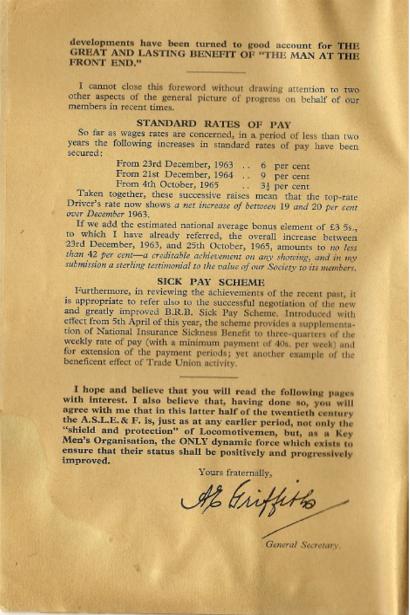
information as Appendix "B". We informed the Railways on
4th February, 1963, that we would accept them provided that
their assurances in respect to "no redundancy", given in
connection with the schemes introduced in 1961, were
reaffirmed.
No assurances were given concerning the question of
redundancy and consequently no agreement was reached on
the proposals; but when they were last discussed on
Enginemen in bonus schemes in marshalling yards-I will refer
later to the anomalies arising from this.
In a letter dated
the time had come to review the 1957 Manning Agreement,
and at a meeting with the Board held on
suggested decreasing the existing element of double manning
of locomotives.
After very careful consideration, my Society submitted
counter-proposals in a letter dated
involved an increase in the double manning of the new forms
of traction.
On
was unrest amongst our member s in regard to the piecemeal
introduction of bonus schemes.
We asked for a meeting to consider this matter, and to discuss
an immediate productivity payment based on
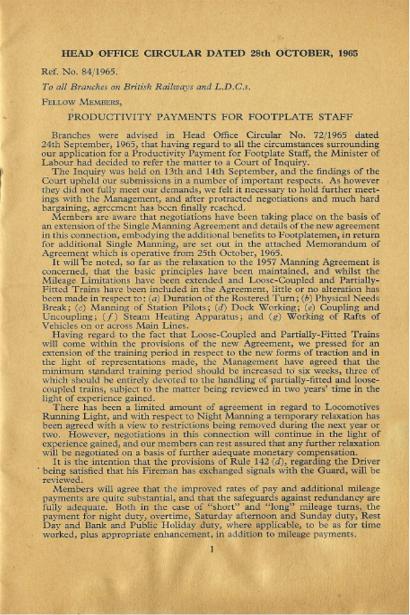
the proposals put forward in January 1963.
We again wrote to the Railways on 17th July, 1964, asking for
an early meeting to discuss our claim. The meeting took place
on 11th August, 1964, when it was agreed that a further
meeting be arranged.
When we met the Board on 30th September, 1964, they
proposed that the application should be coupled to the question
of the manning of the traction involved.
Many discussions have taken place since that date; but the
foregoing, Sir, is a brief history of our claim, giving rise to the
present difficulty.
I would like now for a moment to refer to the position in
relation to manning, and to explain how the various types of
locomotives are manned. When working a train with a steam
locomotive, the unit is, of course, double manned. However,
with the introduction of the new forms of traction, agreement
was reached (as set out in Appendix "A") that certain trains
could be single manned.
We have now reached the stage that if the Railways' proposals
are accepted, there will come a time when Drivers will have
insufficient practical knowledge to work their trains with any
degree of safety.
I would explain that with respect to steam locomotives, a man
starts his career as a Cleaner; he
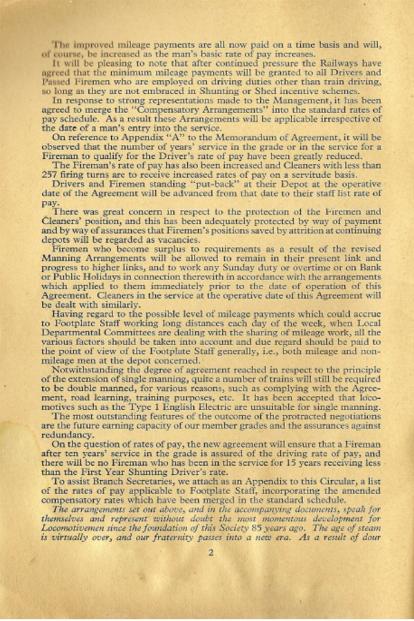
is promoted to Fireman and eventually becomes a Driver.
During his period as a Cleaner and Fireman, he absorbs the
knowledge of the locomotive in the theoretical sense and he
also learns the practical aspects relating to his future position
of Driver; he is, as it were, conditioned for his future
responsibility as a Driver.
Under the Railways' proposals, however, concerning the new
forms of traction, he would receive theoretical training and be
given experience as a supernumerary to the official Footplate
crew-and this would not give him all the experience necessary
to the safe working of his train.
The Management themselves have said that there will be very
little training during the night hours (a position which I will
deal with later). It is in respect of the night hours, foggy
weather and similar conditions, that a man really needs the
most experience. This he gets when a reasonable number of
trains are double manned.
It will be seen from Appendix "A" that at the moment the
Manning Agreement does provide for a large number of single
manned turns of duty; and if the proposals put forward by my
Society during the recent negotiations with the Railways are
accepted, a further substantial number of turns could be single
manned.
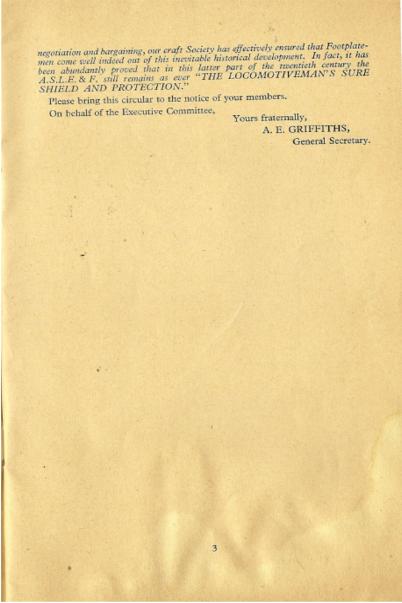
Our proposals, which we feel should be the absolute maximum so far as the, relaxation of the present agreement is concerned,
are set out in Appendix “C”.
I say "absolute maximum" from the viewpoint of safety in particular. I am also concerned m regard to the excessive demands
which the Railways' proposals will Impose upon the Driver.
It will be noted from our suggestions that we are prepared to agree to an extension of the aggregate mileage limitation in
connection with diesel or electric locomotives which work passenger trains (including parcels and empty stock).
We are prepared to agree to a limitation of 250 miles as against the present 200 miles m respect of the aggregate duration of
driving single-manned; and to a non-stop distance of 125 miles as against the present 100 miles.
With respect to fully-fitted freight trains, we have indicated our agreement to the extension of the aggregate mileage limitation
from 150 miles to 175 miles and of the non-stop running distance from 75 to 90 miles. '
So far as diesel and electric multiple units are concerned we have agreed to extend the aggregate mileage limitation from 200
to 250 miles and the non-stop running distance from 100 to 125 miles
For this type of traction we have agreed to a relaxation on certain night turns, i.e., those trams scheduled to finish between
midnight and 2.0 a.m., and trains scheduled to commence between
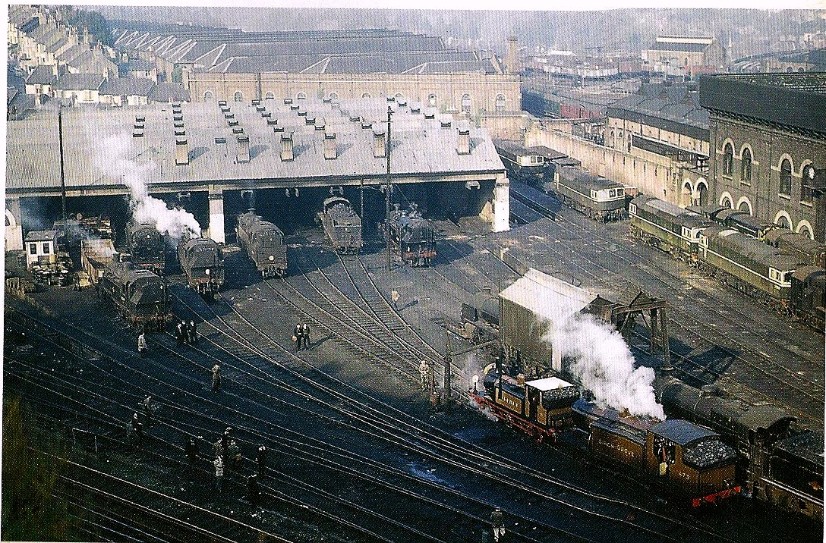
PHOTOGRAPHER UNKNOWN
Above
A scene at Brighton loco sheds, showing the transition from steam to diesel
All loose-coupled trains are at present double-manned. But we have agreed to these trains being single-manned in cases where
the aggregate running time is not more than 100 miles or seven hours per turn of duty, and subject to the non-stop running
time not exceeding 2 1/2 hours.
Clauses (iii), (IV) and (v) of our proposals on loose-coupled trains, concerning manning during night hours, physical needs
break, and coupling and uncoupling, are, of course, in line with the arrangements governing other trains worked by
locomotives.
It is my desire to deal with the question of productivity and to refer to the Railways' proposals at the Sub-Committee meeting
held on 6th of this month, concerning the extension of single manning.
I would like to explain why we feel that our proposals should be the maximum of any extension of the Manning Agreement.
Firstly, with regard to (1), the limitation of aggregate duration of driving single-manned per turn of duty, and (2), the
limitation of continuous duration of driving single-manned.
It will, of course, be appreciated that the limitation is varied in accordance with the speed of the train. This is accepted by the
Railways in so far as their own proposals vary in this regard.
On passenger trains (including parcels, empty stock and multiple unit trains) we feel that 250 miles or 6 hours per turn of duty,
and 125 miles or not more than two hours' non-stop running time, is the absolute limit under which a man should be called
upon to work single manned.
We also feel with respect to fully-fitted freight trains that the aggregate duration should be limited to 175 miles or six hours
per turn of duty, and 90 miles or two hours' non-stop running time. Freight trains should be limited to an aggregate of 100
miles or seven hours per turn of duty, and a non-stop running time of 21/2 hours.
So far as hours are concerned there is very little difference between either of the proposals, but whilst we suggest mileage
limitations of between 100 and 250 miles, depending on the type of train, the Railways are seeking between100 and 350
miles.
We are also maintaining that non-stop distances should be limited to between 90 and 125 miles, depending on the type of
train, whereas Management desire a limit between 100 and 175 miles.
Loose coupled trains will, of course, limit themselves in regard to non-stop running distance, because of the slow speeds of
these trains. However, when a man is required to drive a train above the limitations proposed by us, we maintain he should be
provided with a second man.
Many hours were spent in producing the present agreement, one of the ttributes of which is the limitation on the mileage or
hours demanded of a Driver working on his own.
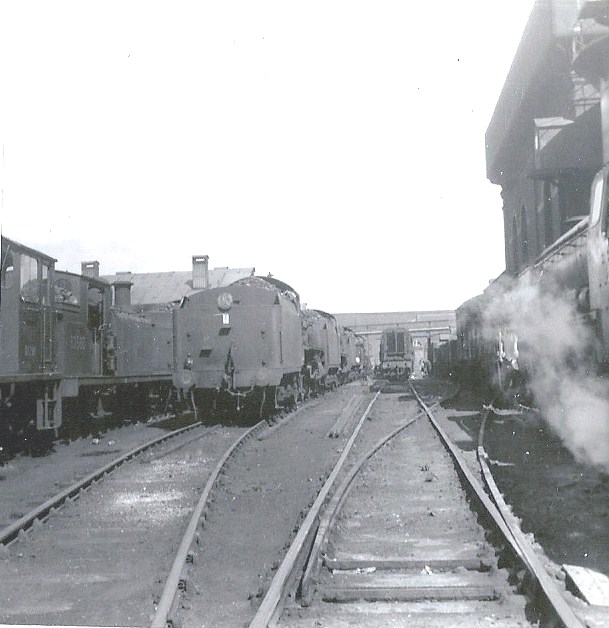
ALAN BARTLETT COLLECTION
Above
redundant steam locomotives in Montpelier Sidings, Brighton
We are talking here of a man who is expected to drive a huge and expensive piece of equipment at speeds of up to 100 m.p.h.-
or, in the case of the slower trains, with extremely heavy loads. He is expected to drive in all types of weather and run his train
to time. We contend that with the heavy concentration required, it is too much to ask a man to accept such a great
responsibility outside the limitations we have suggested. To sit at the controls for a distance of up to 350 miles, concentrating
on signals, gradients, speed restrictions and the like, including the controlling of the "dead man's pedal", is too much to ask of
anyone man.
It has been said that the Second Man has very few duties to perform when there is no steam heating on the train. Here I would
beg to differ. The Fireman or Second Man is a second pair of eyes to the Driver; he assists in the observation of signals and is
in fact far more important to the safe working of the train than the Guard.
You know, Sir, that the weather in this country is not all that we desire; we are subjected to frequent falls of heavy rain and
snow; it is by no means always a fine clear sunny day; we have heavy fog in the winter, apart from many very misty days or
nights at all seasons of the year. When the weather is not clear a Train Driver, unlike a lorry or bus driver, who either travels at
a crawling pace or does not travel at all, is required to run at exceptionally fast speeds peering into the blackness of the night
(or day if foggy conditions prevail). This takes a heavy toll, and believe me has a tremendous psychological effect. Only the
man who travels over long distances in the conditions prevailing in this country can really give a true picture of what is
involved.
I have had personal experience of working over long mileages and can assure you of the very great help and satisfaction
obtained by a Driver from having a second pair of eyes to assist him In his arduous and most concentrated duties.
Concerning the important matter of the duration of rostered turns: we contend that eight hours en a train is more than enough
when travelling single-manned.
Here again the heavy physical and mental demands which I have just outlined apply with equal force. Incidentally, may I
remind the Court that the principle of the eight-hour day has been in operation since 1919 so far as my members are
concerned.
The present agreement gives adequate provision in regard to the duration of turns as rostered. Rosters conform to the eight-
hour principle, though in exceptional cases the Diesel Headquarters Committee (set up under Clause 6 of the 1957 Manning
Agreement) can agree to their being extended beyond this period. Indeed, we have been party to agreeing many turns of this
kind in Circumstances which have warranted such a course of action.
The proposals put forward by the Railways in this connection come in fact very near to where we would like to be in the
interests of all concerned. I suggest that agreement could no doubt be reached in this connection.
On the limitation of night hours of duty, my Society and membership feel very strongly so far as any proposal to amend the
Manning Agreement is concerned.
The relevant clause was one of the most important of any in the 1957 Agreement and it was framed after much investigation
in the light of medical evidence.
It was established that a man is at is lowest ebb during the hours in question and our submission is that it is unfair ,and indeed
does not contribute to safe working, to run trains during the night hours with only one man at the front end.
The Management maintained that their evidence now differs from the information in their possession in 1956 and 1957. It has
in fact been stated that a man who is regularly rostered on shift work is not affected by tiredness during the night time.
Even if we accept this contention (which we do not), it has to be emphatically stressed. that a Driver works Irregular shifts,
and his case, in this respect, as indeed many others, has nothing in common with that of regular shift workers m outside
industry.
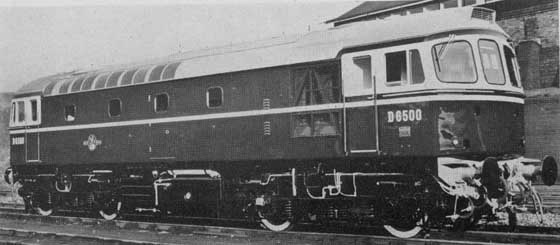
PHOTOGRAPHER UNKNOWN
Above
The new B.R. Type 3 diesel locomotive, later becoming a class 33
His work is not on the shift basis as generally understood namely 6 0 a m
Footplate staff are booked for duty commencing literally at any minute of the twenty-four hours, and often seven days per
'week. Thus there is no regular pattern m the normal sense of shift work.
It is natural for a man to be tired during the hours from
during these hours however much sleep he may have enjoyed during the day. I say "enjoyed'" but in fact everyone who has
tried it knows that it is difficult to sleep during the daytime, particularly If (as is the usual case) there is noise from children
and other sources which are not normally so evident at night time.
Frankly, there is no stronger point of disagreement between my Society and the Board than exists over our firm contention that
in general it is unjust and unsafe to single-man trams during the night period in question.
The Board at various meetings have maintained that it is the Second Man who would be overcome by tiredness before the
Driver. This view we are totally unable to accept. Both men of course should be, and are, alert as it is possible to be. We say
that as no man under the special circumstances I have indicated in relation to the Footplateman's way of life, can be 100 per
cent during the night hours~ we must maintain the confidence of the train crews and. the travelling public alike by retaining
the principle of double manning during the night hours.
This is our grave concern, and there is no question of our seeking to retain men who are not needed.
Concerning the physical needs break, the present agreement provides for a 30-mmute break between the. third and fifth hours
of duty. Having regard to all that is involved when driving single manned, we maintain it is essential that the principle
underling this arrangement should continue in operation.
It is not unreasonable to ask to be provided with toilet facilities during, the specified period; nor for a man to be given an
adequate break of 30 minutes for this purpose and to allow him to take his meal.
The Railways' present proposals, as set out in the document attached to the R.S.N.C. Sub-Committee Minutes of the Meeting held on 6th September, could form a basis of agreement. However, in order to control the position at headquarters' level, all
exceptional cases (including the turns which can be rostered 10 minutes before the third hour or 10 minutes after the fifth
hour) should be subject to agreement between the headquarters of the Region and the Trade Unions.
On this understanding my Society is prepared to agree to a relaxation of the present arrangements, and we will assist in every
way we can.
The Railways have said that where it can be proved that P.N. Breaks rostered outside of the limits can be brought within the
third and fifth hours, they will make the necessary alterations; and we for our part maintain that in this modern age it should be
possible for the Railways to devise a rostering arrangement which would bring almost all Physical Needs Breaks within that
period.
It should not normally be necessary for the Trade Union to advise the Railways as to how to re-roster their diagrams. I would,
however, say that of course we are quite prepared to co-operate where appropriate, and in cases 'where it is considered
impracticable to roster a break between the third and fifth hours of duty, the turn in question could be the subject of an early
meeting at headquarters' level. On this latter point we feel very strongly, because where authority is given to the local people
to administer an agreement such as is suggested in the Railways' proposals, they are in fact prone to take the easy way out, and
in connection with this matter would be inclined to roster many P.N. Breaks to commence before the third hour or to terminate
after the fifth.
As an example of this, the Board are allowed, in accordance with Statutory Instrument 1962 No. 183, to utilise young persons
on night duties.
The exemption from the appropriate provisions of the Factory Act relating to the employment of young persons at night was
based on the premise that such persons would only be rostered on night duty in cases where it was impracticable tei run the
service and cover all the turns of duty by adult staff.
Our attention was, however, drawn to the fact that these young people were, contrary to this principle, being rostered on night
duty on a very large scale; and it was necessary for us to meet the Board with a view to their instructing their local people to
adhere to the spirit and- Intention of the arrangement in question.
The Board have produced isolated rosters in which it would be impracticable to provide a break between the third and fifth
hours. We maintain that these rosters should not be taken in isolation; we say they should be examined with other rosters in
order to ascertain whether or not they could suitably be amended.
May I add that the Southern Region Electric Drivers were given the facility we are here seeking, long before the present
Manning Agreement was introduced; and they do not appear to have experienced any difficulty in that connection.
Before dealing with the further items referred to in the Annexure, I should t this point emphasise that it is the opinion of my
organisation that the majority of the Railways' proposals are essentially bound up with the question of rostering.
We feel that the diagram department is inadequate; that in this modern age a more intelligent approach could be made in this
regard.
The whole of Section "A" of the Annexure could be adequately covered by more intelligent rostering if taken in conjunction
with the proposals put forward by my Society.
Above the 1965 Manning Arrangements
A Driver working single-manned for a distance of 350 miles would require a payment equal to 24 hours for that particular
duty. On the other hand, if that journey were worked in two stages by two successive Drivers, they would each require
payment equal to 121/2 hours, and the cost to the Railways for that same mileage would be 25 hours' pay. (That is, of course,
based on the proposals set out in Appendix "D" to the Minutes of the meeting held on 6th September last.)
Surely, in a case of that description, in which the saving is only in the region of an hour or so, the Railways do not seriously
insist on a Driver undergoing the extreme pressure of covering a distance of 350 miles in one day, possibly five or even six
days a week.
We read in the daily press of the absenteeism in the coal mines. This is a feature which is not at the moment prevalent on
British Railways so far as Footplatemen are concerned. However, if we adopted the Railways' proposals on mileage limitation,
the strain and effort required would, in our submission, be well-nigh unbearable for the men involved, and I am confident that
they would develop an outlook which does not exist amongst these most conscientious men today.
Turning now to the matter of locomotives running light; in our view the agreement presently obtaining gives the Railways all
the scope that is desired or is necessary.
It is, of course, sensible and appropriate to provide a Footplateman to perform footplate duties, and we can see no reason for
extending the agreement.
The proposals put forward by the Board give too much scope to the people responsible for local arrangements, who would
undoubtedly take undue advantage of the position.
It has been suggested that where the journey of a locomotive running light comprises part of train or trip working, the Second
Man could be a Guard or Shunter. May I therefore draw attention to the fact that under such an arrangement it would be
possible to utilise men from either of the two last-mentioned grades, both outside the Footplate line of promotion, on a journey
of, say, a distance of up to 40, 50 or even more miles.
Quite apart from the fact that a Shunter may not be experienced in working one particular section of line, it is just not sensible
on general grounds to have such an arrangement. We could and would get to a position in which men in one grade would be
performing the duties of another grade for which they may not be qualified either by way of training or even in the physical
sense from a main-line point of view.
The Railways may say (as indeed they have done during negotiations) that to bring a locomotive to a depot after a journey, it
would be necessary for them to provide a brake van for the Guard if their proposals are not accepted. We cannot accept that
this would in fact be necessary in the majority of cases. To explain this more fully: it is the intention of the Board to close the
majority of depots as we know them today. They intend to have a minimum number of depots supplemented by booking on
and off points. These points will, in most cases, be adjacent to the Marshalling Yards where the locomotives will be stationed.
It therefore follows that with proper rostering the trains can commence and terminate where the locomotive is berthed.
Any amendments to the present agreement must essentially be designed for the future-when the Railways are fully electrified
or dieselised-and I am sure the Board will agree that this is so.
It will therefore be appreciated that the greater part of light engine working, so far as the actual working of trains is concerned,
will be negligible; and where it is necessary to use a locomotive from one of the main depots? there will be sufficient men in
the line of promotion to accompany the Driver to the traffic yard.
The utilisation of the men in the line of promotion to Driver will serve two purposes; firstly, they will man the light engine as
men who are properly qualified to do so and, secondly, it will assist in giving them experience m the light of their future
employment as Engine Drivers.
We fully agree with the Board's proposals regarding locomotives working rafts of vehicles on or across main lines, and would
have no objection to discussing, any particular case with the Region.
The Board's proposals in regard to the manning of Station Pilots are also acceptable to my organisation, and this again applies
to the proposals on Dock Working, which are in line with the present arrangements.
With reference to coupling and uncoupling, and to steam heating apparatus: here again we have no quarrel with the Railways.
On the latter subjects. It would obviously be impossible for a Driver to attend to the steam heating apparatus and drive his
train at the same time.
I need say no more on either of the two points as we fully concur m this section of the Board's proposals.
It will be noted in Clause 5 (c) of the Annexure to the R.S.N.C. Sub-Committee Minutes of 6th September, under the heading
of Staffing Arrangements, that provision is made for the protection of -the position of Firemen and Cleaners, arising from the
introduction of a relaxation of the Manning Agreement.
We have maintained that such provision should also include men who are surplus to requirements, arising from modernisation
and associated developments.
The introduction of new forms of traction, the speeding-up of trains, the increased loading of trains, are all factors which
contribute to redundancy, and in many cases it will be too difficult to differentiate as between one case of redundancy and
another.
Furthermore, the closing of depots and transfer of work from one depot to another is causing great hardship to our members.
The wholesale closure of depots is now taking place, and having regard to the Withdrawal of services, men are experiencing
extreme difficulty in travelling to work at their new depot.
Difficulty also constantly arises in obtaining housing -accommodation at the new depot or Signing-on point, resulting in men
with 30 and 40 years' service finding it necessary to leave the service.
We must retain the younger men and the only way to do this is to guarantee their future position in the line of promotion. The
next three items, namely, Rates of Pay and Compensating Arrangements; Incentive Schemes; and Increased Mileage
Payments, are all related items and I would prefer to deal with them collectively and following a general reference to the
question of Productivity.
We accept that Productivity Payments must, of course, be related to productivity. But we submit also that Footplate Staff have
already been contributing to increased productivity for a long period of time-and will continue to do so with the faster timings
and more economical rostering-but no additional payment has been forthcoming on a national basis.'
When the present Manning Agreement was introduced, no additional payment was introduced by way of productivity
payment, although the savings to the Railways must have amounted to many millions of pounds per annum.
When Mr. Guillebaud and his Committee conducted the exercise which resulted in the 1960 rates of pay agreement, they
carefully examined all grades, taking into consideration the type of. work and responsibility of the men concerned. As a result
they decided-quite rightly-that the Driver's work and responsibility merited his being placed in the highest category of
Conciliation grades.
However, we now have the invidious position in which men with a basic rate of some £5 per week less than that of a Train
Driver are receiving as much or, in some cases, more wages for an 8-hour day than the Driver.
The majority of men in the line of promotion, and certainly all Drivers, have years of service behind them; they are doing
responsible and arduous work, have a wealth of experience and knowledge, and conform to a rigid medical and practical
examination. Yet in many of the other grades men are receiving bonus payments after a very limited time in the service, and in
the majority of cases these men do not require the same medical' standard as a Driver and are not required to have the
technical knowledge arid the experience required of a Driver.
In the Footplate grade itself we have anomalies; a Driver could be reduced in grade to a Shunting Driver, and such reduction
could actually result in a substantial increase in earnings by way of bonus payment.
We have drawn the Railways' attention to cases in which a man could work an express passenger train in foggy conditions and
receive only a nominal extra payment of 2s. by way of mileage, whilst on the following day he could be employed on shunting
duties and receive upwards of 18s. as an additional payment.
There can be no doubt that quite apart from the proposals on Manning, Footplate Staff have in no small way contributed to
increased productivity, and continue to do so.
In 1964 the Railways had 9,633 locomotives; they expect in the near future to work all trains with a fleet of 5,375 diesel or
electric locomotives.
They cannot do this without the full co-operation of Footplate Staff, who are required to learn how to drive these new forms of
traction and be repaired to perform minor repairs (they get no extra payment for this additional knowledge).
To run the Railways with a limited fleet as envisaged, they must increase the load and speed of the train; again a case in which
a Driver receives 'no additional payment in respect of the additional loading and speed,
The Railways now run 1,100 "Company" freight trains' a week-350 more than a year ago. These trains carry complete train-
loads of individual customers' products and 1,000 of them have a payload of 500 tons each.
Last year there were about 150 trains a week carrying petroleum products; today there are well over 300 of these trains
carrying full loads. Payloads on these trains amount to as much as 1,200 tons a train.
The Railways have introduced "Export Express" services, giving a "next day" delivery to the major ports.
They are quickly developing "Car Carriers"; at present these carry full loads of 75 motor vehicles, It is the intention to
introduce trains of this type with a carrying capacity of 125 motor cars, travelling at speeds of up to 75 miles per hour.
This is true productivity, separate and apart from any reference to the Manning Agreement.
Productivity is based on output. If a man involved in a bonus scheme in a factory produces more than the "norm" he receives a
higher payment. If a platelayer exceeds a certain quota, he receives additional payment. In fact, a platelayer in a normal
working week can increase his earnings by over £3 per week and receive a higher payment than a Fireman who may have
many years' service and experience behind him.
Again we have referred the Railways to other anomalies such as Fitters' Mates, who in some cases can receive, without
overtime, a higher payment than a main-line Driver.
I am sure this is a position which would not be tolerated in outside industry, either by the management or by the men. Here
you have a skilled Driver, who has been in the service for many years; he is required to reach a very high eyesight and general
physical standard, have a wealth of knowledge with respect to the traction he drives and the roads over which he travels, and
he must be prepared to work in all types of weather conditions. Yet a man could come I almost "off the street" and without
overtime receive higher pay than such a skilled key worker. '
Engine crews are working to capacity; they are not wasting time going back to the shed to prepare and dispose of the engine to
anywhere near the extent which applied in the case of the steam locomotive. For the major part of a Train Driver's turn of duty
he is engaged on productive work; he should be paid accordingly.
It has been said by the Management that they cannot accept that the earrings of a particular grade can be compared with the
earnings of another grade, I agree with that; I do not agree, however, that a Train Driver with all his responsibility and
knowledge, coupled with his contribution to productivity, should be earning no more than a man in a much lower grade. Such
a position is frankly untenable.
Guillebaud classified Drivers; he recommended that Train Drivers should receive more than Shunting Drivers. This
classification was introduced; but now, instead of receiving 16s. per week less, a Shunting Driver can in fact earn £3 or £4 per
week more than a Train Driver.
At a Sub-Committee meeting of the British Railways Productivity Council held on
in relation to work study in freight yards. In this document it was stated as a result of investigations that it was usually evident
that substantial improvements in freight train timekeeping, earlier release of locomotives to depot, quicker clearance of
running lines, and reduction in marshalling time, could be achieved. These are brought about not by the faster working of the
staff but by ensuring that they are more continuously employed and ineffective work reduced.
The report lays great stress upon timekeeping, and states that the proposal for incentive schemes combines the aspects of
timekeeping and labour performance so that timekeeping represents two-thirds of the total shunting performance and labour
performance the balance of one-third.
The point I wish to make here is that it is not the shunting staff who alone contribute to timekeeping although it is the shunting
staff who receive the additional payment. Another point I am stressing concerns the reference to timekeeping which represents
two-thirds of the shunting performance; surely the same must apply to the actual train running,
If the Train Driver through his -skill and knowledge did not run his train to time there would be disorganisation in the shunting
yards. In addition, if there is a quicker turn-round in the marshalling yards it follows that there is less wastage of time in
respect to train running, and therefore greater productivity.
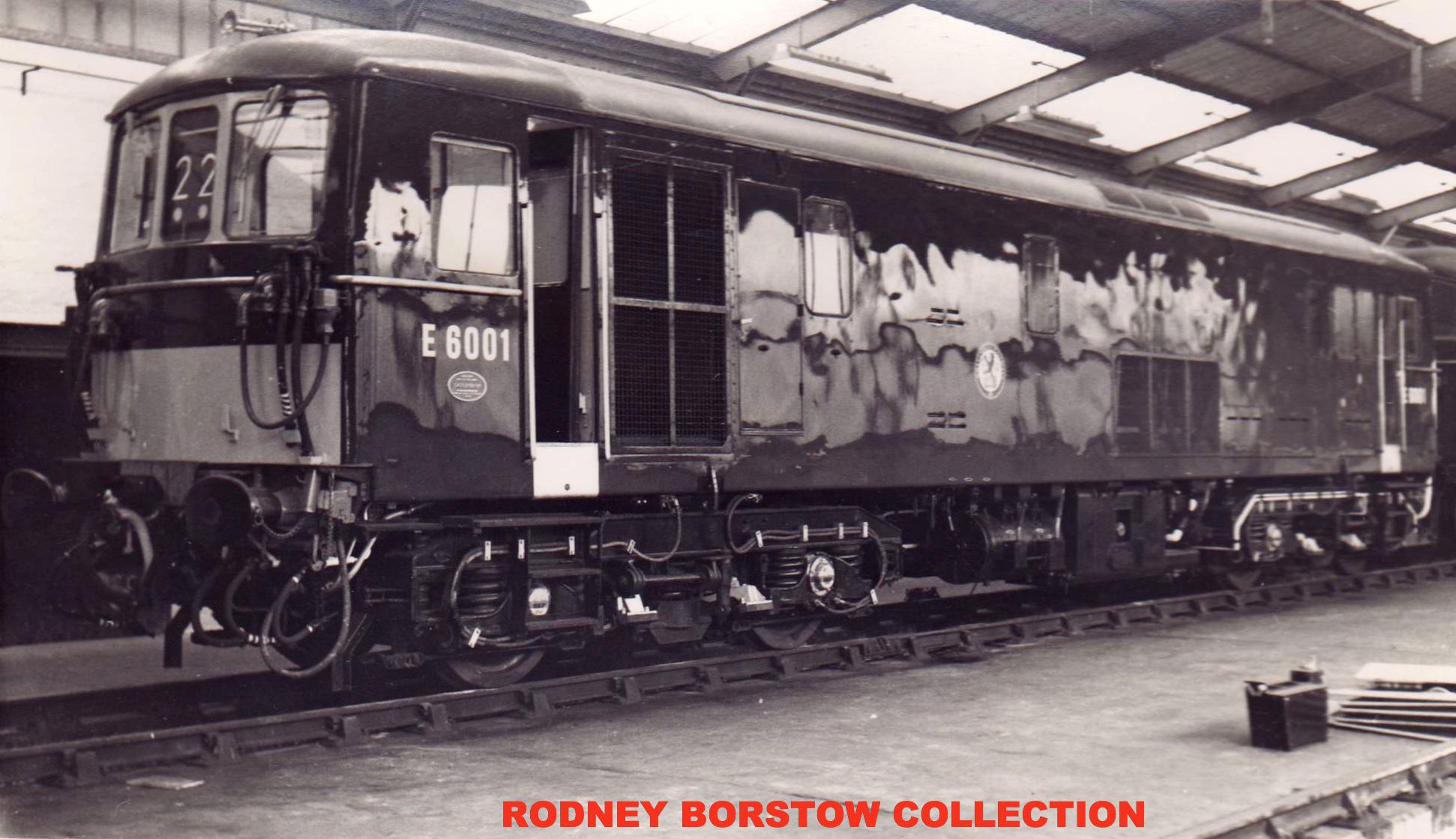
Above
Electic Diesel locomotive, class 73 locomotive
At a meeting of the Productivity Council held on 28th July, 1961', example were given of work study schemes which had
produced considerable savings.
In example 1 there was a saving of some 270 staff. The scheme produced a net saving of £90,000 per annum after paying a
bonus to the remaining staff amounting to £94,000 which gives an average weekly bonus of over £2 per week to each man.
Example 2 showed a saving of 85 men, the remaining staff receiving £23,000 by way of bonus with a net saving of £24,000 to
the Railways; the staff here again receiving almost £2 per week by way of bonus.
Example 6 was very interesting; it showed a slight increase in tonnage handled and carted by fewer staff. A Train Driver gets
nothing for increased tonnage handled, and so far as cartage is concerned, if a diagram is re-rostered to enable the Driver to
work 100 miles instead of 65 miles, he receives an extra 1s per day under the present mileage agreement.
On the other hand the staff involved in the scheme set out in the example enjoyed the benefit of over 50s. per week in
increased earnings (this was four years ago, and the rates have probably increased substantially since then).
In table 9 on page 35 of the recent Report on the Development of the Major Railway Trunk Routes it is anticipated that a train
running at 60 m.p.h. today will be travelling at 70 m.p.h. in 1984. Trains which now run at 30 m.p.h. (and these represent one-
third of the total number of trains) will run at 50 m.p.h.-an improvement of 66 2/3 per cent on the timing. Eleven per cent of
the total number of trains which at present run at speeds below 20 m.p.h. will be increased to 35 m.p.h. which represents an
improvement of 75 per cent in timing.
On this basis a Driver at present working a train over a distance of 60 miles, could in fact, when his train is speeded up, work
105 miles. For this increased mileage he would receive the princely sum of 1s. 6d. under the present Mileage Agreement.
The Management have said, at recent Productivity Council Meetings, that the greater power of the diesel and electric
locomotives is being exploited to increase train loads. It has been stated that these new forms of traction have brought about
considerable economy in operating costs and have provided increasingly accelerated services over the last five years.
Special emphasis has been placed on the excellent co-operation from the staff and Trade Unions, especially in connection with
the retraining of Footplate Staff.
Great stress has been laid upon the important role which Liner-Trains will play in the future of British Railways-a Driver
working one of these important trains over a distance of say 130 miles would at the moment only receive an additional
payment of 2s. 6d.
It is our submission that the facts speak for themselves-and they are facts which are causing a tremendous amount of unrest
among my Society's member grades. These men, conscious as' they are that productivity per man has considerably increased
and will continue to increase, find this feature going unrecognised so far as they are concerned, whilst at the same time they
are surrounded by staff in other grades, doing less responsible work, who are recompensed for higher productivity.
No wonder therefore that discontent runs high in this state of affairs, which is one that in the interests of all concerned should
be rectified forthwith. In the 1965 Edition of the British Railways Year Book the Board underline the question of Productivity
on the Railways during the last year or two. I would like to take this opportunity of quoting extracts from this book.
"The trend towards ever-rising annual deficits was reversed in 1963 when the working deficit fell to £82 million-an
improvement of £22 million on the previous year. The welcome progress towards solvency continued in1964 with a further
reduction of the working deficit to £67' million." This noteworthy improvement was achieved largely through savings in
working expenses, in spite of rising prices for most purchased commodities and the effect of two staff pay increases. In 1964,
however, there was, additionally, a significant increase of £5 million in gross revenue." Working expenses fell by about £27
million over the two-year period, equivalent to £61 million if wage and price increases are discounted. The principal elements
of this saving were:
a) £21 million reduction in the cost of train working, largely from the displacement of steam by diesel and electric traction and
the more productive use of locomotives, carriages and wagons.
b) £28 million reduction in the cost of all forms of maintenance, because of the reduced size of the rolling-stock fleet and the
increased use of labour-saving equipment and techniques,
c) £12 million reduction in other costs, mainly through the closure of many terminals and higher productivity at those
remaining open."
We are further informed from the same source: "Punctuality continued to improve, and by September 1964 was substantially
better than in 1962. Towards the close of the year a number of factors impaired the high standards reached, but this was a
temporary setback. The changeover from steam to diesel and electric traction continued, resulting in higher average speeds
and shorter journey times. The proportion of coaching train miles run by diesel and electric traction rose to 87 per cent.
Striking progress was made in the acceleration of passenger trains; the summer timetable for 1964 recorded 526 trains booked
to make start-to-stop journeys at 60 m.p.h. or more, including 25 averaging 70 m.p.h. or over.
This compares with 200 in the summer of 1962. The fastest scheduled run, introduced in the winter 1964 timetable, is that of
the 07.45 Euston to Liverpool train which covers the 61 miles between Nuneaton and Crewe at an average speed of 76 m.p.h.,
start-to-stop.
"The principal routes to benefit from the accelerations were the East Coast main line between London, the North-East and
Scotland (where reductions in journey times of up to 63 minutes were achieved, and an hourly-interval 60 m.p.h. service was
introduced between King's Cross and Newcastle); Paddington and South Wales with savings of up to 58 minutes; Plymouth
and the North-West (up to 65 minutes); while the introduction of a high-speed electric multiple-unit service between London
and Clacton, Frinton and Walton cut up to 28 minutes from the journey times on this comparatively short route.
"The proportion of freight-train mileage worked by diesel and electric power nearly doubled in the two years, reaching 46 per
cent during 1964.
In order to take advantage of the higher speeds and heavier loads now attainable, as many trains as possible are run either fully
or partially power-braked. Helped by the growing proportion of brake-fitted wagons as older, non-fitted wagons are
withdrawn, the booked weekly mileage of fitted and partially fitted trains rose to 59 per cent of the total.
Among these are the 'Company' trains-block trainloads for individual firms -of which by the end of 1964 over 850 were
booked to run each week. Cement, chemicals, motor cars and oil products are being carried in this way; one oil train regularly
hauling a gross load of 2,000 tons between Southampton and Birmingham is currently the heaviest train in the country."
All these developments-increasing the speed of trains, increasing the load, etc.-are factors which improve productivity, and
from the fact that the Driver is involved in this intensified working, it follows that he contributes to the said improved
productivity in no small way.
At
50,472; a reduction of 2,887 or 5.4 per cent in six months.
Since July 1963 the number of Drivers has been reduced from 34,163 to 30,601; a reduction of 3,562; in the same period the
establishment of Firemen and Cleaners has decreased from 28,744 to 19,299, a reduction of 9,445.
A proportion of these reductions may have arisen as a result of loss of work, but we contend that the bulk of this saving on
staff has been brought about by increased productivity. The Railways will not accept that a Productivity Payment could be
made on so-called past productivity. We maintain that this is not simply past productivity, but very much continuing and
intensified productivity; we make the further point that we have been seeking the establishment of a productivity payment on a
national basis since 1961.
With regard to the savings on staff prior to the original submission of application, I would take the opportunity of drawing
attention to the numbers of Footplate Staff on British Railways in 1957 when the present Manning Agreement was introduced.
There were 83,157 Footplate Staff on the Railways at that time-there are less than 50,000 now.
Surely some form of recognition should be given to productivity as developed in the past, as well as to the future productivity,
particularly having regard to the fact that bonus schemes for certain other grades have been in existence for some time.
In five years' time over 11,000 Drivers will have left the service by way of normal retirement.
We do not have details of the ages of these men, but if we say one-fifth of them will retire in the next year, there would be,
assuming that our proposals for extension of single manning were adopted, an almost immediate saving of 2,200 Firemen’s
positions, making a saving of over £2 million per annum.
When we thus estimate a saving representing £1,000 per annum in respect of Firemen's positions, we are quoting a modest
figure, because one must in addition to earnings take into account the following in the case of each position saved:
National Insurance contribution; Annual Leave payment; Bank Holidays (these three items alone amount to almost £2 per
week); Clothing; Sick Pay; Pensions; and all other items which involve the Railways in administrative costs in respect to each
individual member of the staff.
The present establishment of Firemen and Cleaners is approximately 19,300 and a large percentage of these would, of course,
disappear following amendment of the Manning Agreement.
A number of Drivers' positions would also be absorbed.
If therefore we take a modest estimate of 12,500 of these positions, the Railways would save overall more than £250,000 per
week, or over £13 million per annum.
We were advised by the Chairman of the Board in May that the cost of Productivity Payments to Footplate Staff would be £3
million per year. If our proposals, as set out in Appendix "D", were to be accepted, the cost might increase to approximately
£4 million, giving a total saving of £9 million by way of a relaxation of the Manning Agreement alone. '"
Thus, if this saving is taken into consideration along with the other contributions to Productivity which are made by Footplate
Staff, our proposals in relation to additional payments are on a very modest scale indeed.
When we agreed to an extension of single manning as set out in my Appendix "C", we did so on the basis of the additional
payments referred to in my Appendix "D", and not to the payments as set out in Appendix "D" to the Minutes of the R.S.N.C.
Sub-Committee meeting held on 6th September.
In this latter connection it must be noted that the Railways have now withdrawn the offer if no agreement is reached in respect
to manning during the night hours, and have substituted a vastly reduced offer of additional payments as set out in Appendix
"C" to the Sub-Committee Minutes of 6th September.
They have also indicated that the proposed improvements in Drivers' rates of pay (Sub-Committee-Appendix "A" and
Appendix "B") are withdrawn if a relaxation in manning during night hours is not accepted.
It should be noted also that the difference between the two offers put forward by the Railways in respect to additional payment
bears no relation to the additional savings which would accrue if there was a relaxation in manning' during night hours.
There is in fact no foundation for such a large reduction and in any event the original offer does not meet the problem so far as
my Society is concerned, having regard to the extent to which we are prepared to give in relation to the relaxation of the
Manning Agreement.
Our proposals give the Management the scope they are seeking particularly bearing in mind the requirements for the constant
training of potential Drivers.
Finally, I respectfully emphasise that in the course of these long-drawn and difficult negotiations, my Society has in fact
moved a tremendous way in seeking to reach agreement with the Board; notably, following our recalled delegate conference
on August 10th, we have abandoned our insistence on discussion of productivity payment as an issue separate and distinct
from the amendment of the Manning Agreement. We still think that we were entirely right in our previous attitude on this
question, and that we were fully justified in seeking a payment based purely on the existing and mounting increase in the
productivity of our member grades.
Nevertheless, I repeat that we moved from that position; and we have shown ourselves willing to countenance a considerable
increase, highly lucrative to the Board, m !he proportion of single manning in return for a productivity payment on a Just and
adequate scale.
Unfortunately we have been unable to reach agreement with the Board even on this new basis. They have not, in fact, shown a
readiness to match our own proved willingness to move.
The issue is before this Court today because the Board are not prepared to meet us on the principle 'of night manning-highly
important to us for reasons which I have indicated-nor do they seem willing to concede to their Footplate Staff a due and
proper share in the benefits accruing from increased productivity.
In concluding my opening statement, in which I have endeavoured to set forth the considerations involved in this dispute I
would respectfully and most earnestly ask the court to find in favour (a) of our contention respecting retention of the principle
of double manning during night hours; (b) of the provision, on a fair and adequate scale, of a productivity payment to our
member grades; and (c), of a reduction in the Board's proposed limit on the amount of driving single manned per turn of duty.
It is our very sincere hope that as a result of the deliberations of the Court a satisfactory and enduring solution may be found
to this unhappy dispute.
APPENDICES SUBMITTED TO THE COURT
"A" Diesel and Electric Manning Agreement-Memorandum of Agreement dated
"B" L.M. Region: Incentive Bonus Schemes-Freight Train and Trip Working.
"C" A.S.L.E.F. proposals-Diesel and Electric Manning Agreement.
"D" Scale of Mileage Payments: Railways' Proposals-A.S.L.E.F. Proposals.
EXTRACTS FROM THE FINDINGS OF THE COURT
"The two main issues with which the negotiations leading to the setting up of this Court of Inquiry have been concerned are
the revision of the Manning Agreement reached between the former British Transport Commission and A.S.L.E. & F. and
N.U.R. on
* * '* * *
Freight trains not fully fitted with automatic brakes "The 1957 Agreement provided for single-manning only on freight trains
which were fitted with automatic brakes throughout. A.S.L.E. & F. had originally pressed for this restriction to be maintained.
Their view was that the safety of single-manning on 'loose-coupled' freight trains (i.e. trains without automatic brakes on all
wagons) was not established, and referred to the greater danger of such trains becoming uncoupled in the middle while in
motion: to avoid this required greater skill on the part of the driver. The Board's view was that the second man on the cab did
not materially help the driver in his task of handling loose-coupled trains. By 6th September, however, A.S.L.E & F. were
prepared to agree to such trains being single-manned in certain cases dealt with below ....I conclude that this is a point on
which the parties should find it fairly easy to reach agreement, and I agree that there is no reason why loose coupled trains as
such should not be single-manned.
Total length of driving turns
"Under the 1957 Agreement, the limits on the total length of a single-manned driving turn (i.e., including rest breaks etc.)
were 200 miles or six hours for passenger trains and 150 miles or six hours for fully-fitted freight trains. In May, 1965, the
Board proposed that turns should -be limited by time only, not mileage, but, for the sake of reaching accommodation with the
Unions, were prepared by 6th September to introduce mileage restrictions. The proposed limits were 350 miles or six hours
for express passenger trains and freight trains permitted to run at over 50 m.p.h.; 250 miles or six hours for stopping passenger
trains; and seven hours with mileage limits of 100, 200 and 250 miles for different classes of slower freight trains. A.S.L.E. &
F. were broadly in agreement with the proposed limits on hours (except that they wished to retain the limit of six hours on all
fully-fitted freight trains), but sought lower mileage limits: 250 miles on express passenger trains, 175 miles for fully-fitted
freight trains, and 100 miles for other freight. . . . '
"This was one of several points on which it seemed likely on 6th September that agreement could have been found by further
negotiation. For my part, I think the Board's proposals are reasonable as they now stand.
Length of continuous driving single-manned"As against present limits on continuous driving single-manned of 100 miles or
two hours (average speed 50 m.p.h.) for passenger trains and 75 miles or two hours (average speed 37t m.p.h.) for fully-fitted
freight trains in the 1957 Agreement, the Board proposed limits of 175 miles or 2t hours (average speed 70 m.p.h.) for
passenger trains and freight trains permitted to run at over 50 m.p.h., and 125 or 100 miles and three hours (average speeds 42
and 33 m.p.h.) for slower freight trains. A.S.L.E. & F. thought the absolute limits on the driver's capacity were 125 miles or
two hours for passenger trains (average speed 62t m.p.h.), 90 miles or two hours (average speed 45 m.p.h.) for fully-fitted
freight, and 2t hours (without distance limit) for other freight trains. '
"Here again there was comparatively little difference between the parties, and I would regard the Board's proposals as
reasonable.
Night manning
"At this point we come. to the core of the dispute. Under the 1957 Agreement there is no single-manning between
and
restrictions should be wholly removed: and their acceptance as an interim measure of the A.S.L.E. & F. counter-proposal to
shorten the 'proscribed hours,' for multiple-unit trains only, to 2 a.m. to
coupled with an offer on 6th September 1965, of a much lower scale of mileage payments."
* * * * *
": .. I recognise, and I think the Board also recognises, the very strong feelings which the footplatemen have on this issue.
They have had relatively little time to accustom themselves to the measure of single-manning which was introduced in 1957,
especially as the proportion of locomotives to which the Agreement applied was comparatively small at that time and has
increased steadily since then, and to remove the restrictions completely could at this stage provoke great unrest. I therefore
suggest that this part of-the 1957 Agreement should remain unaltered for the time being save in two ways:
(a) as A.S.L.E. & F. have suggested, multiple units finishing their journeys up to
single-manned;
(b) where more economical rostering could be achieved by permitting single-manning for workings terminating up to, say,
1.30 a.m. (
joint committees at regional headquarters, any relaxations, of course, being subject to agreement by both sides.
However, the Board should keep the matter under review and should seek more definite evidence on the effects of fatigue
during the night hours and the ways in Which drivers may be helped to overcome it; while the Unions should also reconsider
their attitude on this matter with a view to agreement on removing the restrictions within the next year or two."
* * * * *
Physical heeds break
"I find the Board's proposals not unreasonable: there seems little opportunity for abuse of a discretionary period as short as 10
minutes outside the normal limits, but anything over this limit should not be left to the discretion of the people responsible for
rostering but should be agreed by the joint regional committees.'
* * * * *
Total duration of single-manned spells
"My own view is that there must be some flexibility in the arrangements in the interests of efficiency, but I suggest that all
rosters over eight hours should continue to be agreed with the Unions (by the regional manning committees, not nationally as
at present). While rosters of up to 8 hours 15 minutes do not seem unreasonable departures from the eight-hour limit, I do not
see why the onus should be wholly on the Unions to show that re-rostering could avoid the need for them. But I would also
stress that the regional committees must be made to work by both side."
Redundancy . . '
"The Board gave a full assurance not only that no footplate staff surplus to requirements as a result of the revised Agreement
would be made redundant but that none would be moved from his present depot against his wishes. If footplate staff wished to
move to another depot (e.g. to improve prospects of promotion to driver), they would benefit from the provisions of current
redundancy arrangements. In addition, to encourage retirement of drivers so as to provide openings for firemen, drivers over
60 years of age at depots where firemen were surplus to requirements m consequence of single-manning would be allowed to
retire under the redundancy procedure. Over·11,000 drivers were due to retire in the normal way over the next five years and
this would make it comparatively easy to absorb surplus footplatemen. A.S.L.E. & F. were satisfied with these arrangements,
although they pointed out that closure of depots would cause some added hardship to footplatemen as they would either have
to move their homes or travel long distances.
"The Board also gave assurances that the earnings of footplate staff affected by the revised Agreement would be safeguarded .... "
* * * * *
Conclusion-productivity payments . . .
"Undoubtedly footplate staff have been increasingly gainfully employed in recent years. Between 1957 and 1964, the ratio of
loaded train miles to numbers of footplatemen increased by over 35 per cent. Footplate staff have shared in national wage
increases, but they have also seen the introduction of incentive bonus schemes to' other conciliation grade staff (of whom
some 30 per cent are now covered) and have felt aggrieved that the Board have not found it possible to reward their effort in a
similar way."
* * * * *
"The Board said that they were prepared to accept the changes which were already capable of agreement and to pay for them.
Clearly, the retention of restrictions on single-manning reduced the savings Which the Board could expect to make, and this
led them to reduced their offer on pay and mileage allowances. But the reduction of 50 per cent m additional mileage
allowances was quite unacceptable to the Unions. The Board themselves said in evidence that this reduced offer was ‘a
compromise, a poor one, a bit illogical and a bit unjustified .by any standards.'
"Given the changes in manning to which the unions seemed prepared to agree at this juncture, what is their just price?
"The Board have found it 'impracticable' to give me a full breakdown of the savings to be expected from amending the 1957
Agreement. Precise calculations of savings and costs are essential to determine productivity payments and I would stress the
difficulty of forming a conclusion without adequate figures."
* * * * *
" ... the Board appear to have underestimated the savings. They stated that without restrictions on night manning, these would
amount to £30 million over 'the next five years or £6 million a year on average. A.S.L.E. & F. 'put. them at nearer £9 million a
year, and the Board's figures do need re-examination.
"I am ... of the opinion that, so far as mileage payments are concerned, the Board's higher offer should stand, as should their
offer of increased rates of pay, for firemen to which no strings were 'ever attached. But the Board's offer at a late stage in the
negotiations, to adjust the wage rates of first and second' year drivers should remain in suspense until restrictions on night
manning are finally removed.
"I would suggest that the parties should resume negotiations on this basis: one further meeting should be enough to carry them
through."For the future I have recommended that the final removal of restrictions on single-manning at night should follow in
a year or two at most. I note the Board’s intention to negotiate without delay for the further development of incentive schemes
for the footplate staff on local freight working who are unable to benefit from mileage allowances to any great extent: this
seems necessary."
THE BRIGHTON BRANCH OF A.S.L.E.&F. WEBSITE.
HAS NOW BEEN MOVED TO A NEW SITE CALLED
IGNITING THE FLAMING OF UNITY
https://ignitingtheflameofunity.yolasite.com/
PLEASE CLICK ON THE IMAGE BELOW
TO TRANSFER TO THIS NEW SITE
CLICK ON THE ABOVE IMAGE TO TAKE YOU
TO THE NEW UPDATED COMBINED AND WEBSITE
IGNITING THE FLAME OF UNITY WEBSITE
https://ignitingtheflameofunity.yolasite.com/
THIS WEBSITE COMBINES THE FOLLOWING WEBSITES
THE BRIGHTON A.S.L.E.&F., THE BRIGHTON MOTIVE POWER DEPOTS
& THE SUSSEX MOTIVE POWER WEBSITES
WHICH EXPLAINS THE EVOLUTION OF THE FOOTPLATE GRADES AND THE
HISTORY OF THEIR TRADE UNIONS AND THE STRUGGLES TO IMPROVE
THEIR WORKING LIVES
CLICK ON THE ABOVE IMAGE TO TAKE YOU
TO THE NEW UPDATED COMBINED AND WEBSITE
IGNITING THE FLAME OF UNITY WEBSITE
https://ignitingtheflameofunity.yolasite.com/
THIS WEBSITE COMBINES THE FOLLOWING WEBSITES
THE BRIGHTON A.S.L.E.&F., THE BRIGHTON MOTIVE POWER DEPOTS
& THE SUSSEX MOTIVE POWER WEBSITES
WHICH EXPLAINS THE EVOLUTION OF THE FOOTPLATE GRADES AND THE
HISTORY OF THEIR TRADE UNIONS AND THE STRUGGLES TO IMPROVE
THEIR WORKING LIVES
